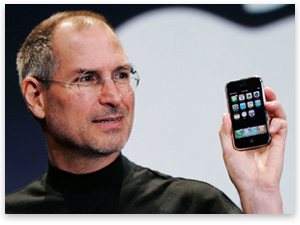
Steve Jobs and the Beautification of Capitalism
The day that Steve Jobs resigned from Apple, hosannas for his life's work and accomplishments erupted from every corner of the earth (or the blogosphere, in any case). He was universally hailed as a genius. He was praised for changing and upgrading our lives in so many ways. He was treated as an innovator who dedicated himself to the well-being of society, and accomplished miracles none of us mere mortals could have imagined. He did more than dream; he acted and created one of the great companies on the planet, a company that has enabled us to live out our own dreams.
It's all true. This kind of language is not just welcome; it is magnificent. The same could be said of millions of great entrepreneurs both inside and outside the hardware and software sectors. Every time I slip on a pair of shoes, I think of the marvels of entrepreneurship and the division of labor that make my foot comfort possible. I have the same sense for those who make my refrigerator, provide lettuce for my salad, create alarm systems for my home and car, own and run chain stores that sell everything from pet food to paper clips, sell me insurance, build our homes and offices, and make it possible for me to buy a plane ticket with a few clicks on a computer — or finger swipes on a smartphone.
 Every entrepreneur in society deserves such praise, and it is also correct to single out Steve Jobs, because his company seemed to push civilization a bit further down the road to progress with mind-blowing consumer products that allow us to do everything from play musical instruments to video talk with people halfway across the world in real time. Apple has dramatically improved our lives — in the same way that all capitalistic ventures have but more conspicuously so.
Every entrepreneur in society deserves such praise, and it is also correct to single out Steve Jobs, because his company seemed to push civilization a bit further down the road to progress with mind-blowing consumer products that allow us to do everything from play musical instruments to video talk with people halfway across the world in real time. Apple has dramatically improved our lives — in the same way that all capitalistic ventures have but more conspicuously so.
Still, there's something odd here. Fast food, chain stores, and sneaker companies are usually subjected to derision and envy-ridden hate in a culture that has too little appreciation for business success. Just look at the amazing attack campaigns directed against Walmart for the crime of making all great things available to just about everyone at low prices. And don't get me started on the daily blizzard of attacks on the most loved and most hated of all hamburger joints.
Why is Walmart derided by the literati while Steve Jobs is made exempt from the anticapitalist stoning sessions that pervade the world of political commentary? After all, he is a billionaire and an unapologetic capitalist who is said to have been influenced by Ayn Rand and whose company has never given a dime to corporate philanthropic efforts. I'm happy about this. It is wonderful that he has been so celebrated. But it is still puzzling.
Countless times I've heard Microsoft's riches attacked because the company has also been an aggressive enforcer of its patent rights that hinder competition and slow technological progress, but I've rarely heard the same about Apple even though few companies have been as extreme on the "intellectual-property" question. Even now, Apple is hitting its closest competition with wicked lawsuits designed to reinforce Apple's monopoly position. As regrettable as that is, I agree that it doesn't take away from Jobs's accomplishments; it's not as if he invented the patent system that he learned to navigate so well. Still, why is Microsoft attacked as a wicked monopolist while Apple gets a free pass?
And why can't the universal adulation of Jobs be extended universally? An article in the Economist noted these strange facts, and offers a theory. The theory goes like this:
Mr Jobs got really stinking rich … by adding a dash of elegance to the lives of consumers by selling them gorgeously refined devices at a premium. The average American's life is not overfull with gracefully sleek design, to say the least, and in many ways our standards of living have not improved upon that of our parents. But Apple under Mr Jobs has offered the mass market dazzling technical progress with the sort of tastefully luxurious sheen usually reserved for the seriously well-to-do. For this many of us are grateful. Moreover, at a time when so many suffer feelings of economic insecurity and powerlessness, mysterious technologies like the iPad give those who can afford them an escapist sense of versatile efficacy that is no less powerful for being fantasy. Indeed, Apple has marketed the iPad 2 in cultishly reverent advertisements as "magical"; it accomplishes the wondrous by inconceivable means all within a ravishing frame. Steve Jobs is a white wizard in wire rims who offers unto us, in exchange for the fruits of mere days or weeks of labour, mesmerising portals to a better, beautiful, more enchanted world where we can have our whim with the flick of a forefinger.
In other words, Jobs's capitalistic acts are made blessed in this culture because he made his products elegant and made our lives more beautiful. One might say that he democratized beauty and thereby earned for himself and his company a kind of Teflon coating from the green-eyed monster.
Does the theory sound implausible? Perhaps at first glance.
But I would say there's something to it. And keep in mind that the Apple attachment to elegance and beauty was not just a feature of one product line. It was pervasive throughout the company. One only needs to compare the power cord of the typical Windows laptop and that of the Mac laptop. The former looks industrial and clunky — a real eyesore. The latter looks, implausibly, lovely, like a dreamy source of life. That same aesthetic sense is present in the boxes in which the products are packed, the way the software works, and even the earbuds (did he invent that word because it sounds better than earplugs?) that let us listen to the goings on inside the iPhone.
And so, through Jobs, our lives became not only more useful and efficient; they became more beautiful. This element of production turns out to be hugely important because it addresses a main criticism that has long been made of capitalism.
Consider this largely mythical scenario by Oscar Wilde of how household furniture in Britain came to be improved in the course of the 19th century:
The houses in which people lived were only fit for blind people to live in. Beautiful things began to be made, beautiful colours came from the dyer's hand, beautiful patterns from the artist's brain, and the use of beautiful things and their value and importance were set forth. The public were really very indignant. They lost their temper. They said silly things. No one minded. No one was a whit the worse. No one accepted the authority of public opinion. And now it is almost impossible to enter any modern house without seeing some recognition of good taste, some recognition of the value of lovely surroundings, some sign of appreciation of beauty. In fact, people's houses are, as a rule, quite charming nowadays. People have been to a very great extent civilised. It is only fair to state, however, that the extraordinary success of the revolution in house decoration and furniture and the like has not really been due to the majority of the public developing a very fine taste in such matters. It has been chiefly due to the fact that the craftsmen of things so appreciated the pleasure of making what was beautiful, and woke to such a vivid consciousness of the hideousness and vulgarity of what the public had previously wanted, that they simply starved the public out. It would be quite impossible at the present moment to furnish a room as rooms were furnished a few years ago, without going for everything to an auction of second-hand furniture from some third-rate lodging-house. The things are no longer made.
Thus did he imagine that the artists triumphed over the public, imposing good taste on the workers and peasants, who, if left to their own devices, would have languished in tackiness forever. Wilde's commentary comes in the middle of his essay explaining that this approach to ridding the world of ugliness would be universalized under socialism. The market, ruled by public opinion, would no longer dictate. The artists would prevail and all things would be uplifted so that social life would be elevated like perfect art.
In Wilde's view — and this remains a common view — the only way that cultural uplift of this sort can occur is when it is somehow dictated by one will from the top down. In this case, he imagines that somehow "the artists" imposed their will on everyone else.
Wilde didn't really get this point, but the artists who made the improved furniture were capitalists too — capitalists just like Steve Jobs. It doesn't take socialism or top-down imposition to achieve this result. It requires a more diversified flourishing of capitalism, which increases wealth and makes available ever more beautiful things to ever more people.
Music is a good example. Today I can instantly hear an endless amount of Schubert, Mahler, Victoria, and Peronin, just as the guy in the office next door can download an equal amount of Lynyrd Skynyrd, Van Halen, and Led Zeppelin. Without passing judgment on which is or is not beautiful, both will always exist in a free market. The desire for a world of perfect aesthetic beauty would lead to the overriding of some people's preferences in favor of others.
A true defender of the market needs to be willing to praise not only elegant things but also crass things — both are part of freedom. There's an old-fashioned value that needs to be relearned: tolerance. We also need to learn the lesson that Leland Yeager so often repeats: the market is not a test of beauty and truth. We look to the market to give us what we need. We need not look to the market to please our highest ideals, which extend beyond the material universe.
 Ludwig von Mises, in his wonderful book The Anticapitalistic Mentality, draws attention to the criticism of capitalism that it is not beautiful. It is ugly, say the literati. It is brash, tacky, materialistic, and caters to common aesthetics. This is a conventional critique offered by intellectuals and artists.
This is what made Jobs different. He managed to create computer and software systems that could not be so critiqued. This undermined what in fact was a main criticism of capitalism for 150 years. He made making money and firing up the core materialism of us all beautiful things to behold. This helped quell this particular criticism, which is as common in our time as ever.
Ludwig von Mises, in his wonderful book The Anticapitalistic Mentality, draws attention to the criticism of capitalism that it is not beautiful. It is ugly, say the literati. It is brash, tacky, materialistic, and caters to common aesthetics. This is a conventional critique offered by intellectuals and artists.
This is what made Jobs different. He managed to create computer and software systems that could not be so critiqued. This undermined what in fact was a main criticism of capitalism for 150 years. He made making money and firing up the core materialism of us all beautiful things to behold. This helped quell this particular criticism, which is as common in our time as ever.
But — and here is the key — he did this not by undermining the market but rather by using the market. In this way, he was different, to be sure, but not unlike the very same entrepreneurs who beautified British home furnishings.
Here is Mises's version of how home furnishing came to be improved — and it makes a nice contrast to Wilde's version:
They contrast, e.g., old furniture as preserved in the castles of European aristocratic families and in the collections of the museums with the cheap things turned out by big-scale production. They fail to see that these collectors' items were made exclusively for the well-to-do. The carved chests and the intarsia tables could not be found in the miserable huts of the poorer strata. Those caviling about the inexpensive furniture of the American wage earner should cross the Rio Grande del Norte and inspect the abodes of the Mexican peons which are devoid of any furniture. When modern industry began to provide the masses with the paraphernalia of a better life, their main concern was to produce as cheaply as possible without any regard to aesthetic values. Later, when the progress of capitalism had raised the masses' standard of living, they turned step by step to the fabrication of things which do not lack refinement and beauty. Only romantic prepossession can induce an observer to ignore the fact that more and more citizens of the capitalistic countries live in an environment which cannot be simply dismissed as ugly.
Mises is right: the way to make capitalism more beautiful is to make capitalism ever more legal and universal, so that we can enjoy ever more products of geniuses in our lives. Even so, life will never be the nirvana that the socialists imagine that they can create if we just give them power. A tacky world of freedom is to be far preferred to a beautiful world of slavery. After all, never has the world seen a more perfect ballet troupe than flourished at the same time and in the same country as the Gulag.
What made Jobs's tenure at Apple great is that he wedded profits with aesthetic loveliness. Not every businessperson can or should do this. Even the entrepreneurs who provided the masses with tacky things are just as deserving of our admiration and praise, for they too do their part to lift us all out of the poverty and squalor that is the state of nature.
And aside from the prettiness of certain products or the elegance of the smartphone, there is another overarching beauty that we find in the market: a lovely, orderly, productive global matrix of cooperative exchange that leads to human flourishing for everyone, even in the absence of a global dictator. This is as beautiful a system as any product Steve Jobs ever made.
Jeffrey Tucker is the editor of Mises.org and author of
It's a Jetsons World: Private Miracles and Public Crimes and  Bourbon for Breakfast: Living Outside the Statist Quo.
Send him mail. See Jeffrey A. Tucker's article archives.
Bourbon for Breakfast: Living Outside the Statist Quo.
Send him mail. See Jeffrey A. Tucker's article archives.
